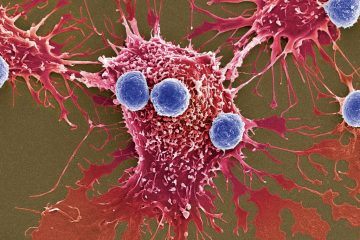Carl Zimmer in The New York Times:
 Scientists have used genetically reprogrammed bacteria to destroy tumors in mice. The innovative method one day may lead to cancer therapies that treat the disease more precisely, without the side effects of conventional drugs. The researchers already are scrambling to develop a commercial treatment, but success in mice does not guarantee that this strategy will work in people. Still, the new study, published on Wednesday in the journal Nature Medicine, is a harbinger of things to come, said Dr. Michael Dougan, an immunologist at Massachusetts General Hospital in Boston. “At some point in the future, we will use programmable bacteria for treatment,” said Dr. Dougan, whose research laid some groundwork for the new study. “I think there’s just too much potential.”
Scientists have used genetically reprogrammed bacteria to destroy tumors in mice. The innovative method one day may lead to cancer therapies that treat the disease more precisely, without the side effects of conventional drugs. The researchers already are scrambling to develop a commercial treatment, but success in mice does not guarantee that this strategy will work in people. Still, the new study, published on Wednesday in the journal Nature Medicine, is a harbinger of things to come, said Dr. Michael Dougan, an immunologist at Massachusetts General Hospital in Boston. “At some point in the future, we will use programmable bacteria for treatment,” said Dr. Dougan, whose research laid some groundwork for the new study. “I think there’s just too much potential.”
Our immune cells can sometimes recognize and destroy cancer cells without assistance. But tumors may hide from the immune system by taking advantage of a gene called CD47. Normally, the gene makes a protein that studs the surface of red blood cells, a kind of sign that reads, “Don’t Eat Me.” Immune cells see it, and pass by healthy red blood cells. But as red blood cells age, they lose CD47 proteins. Eventually the immune cells no longer give them a free pass, gobbling up old cells to make way for new ones. Mutations in cancer cells can cause them to switch on the CD47 gene. The immune system sees these cells, too, as harmless, allowing them to grow into dangerous tumors.
In recent years, scientists have been developing antibodies that can attach to CD47 proteins on cancer cells, masking the “Don’t Eat Me” sign. Then the body’s immune cells learn to recognize the cancer cells as dangerous and attack.
More here.
